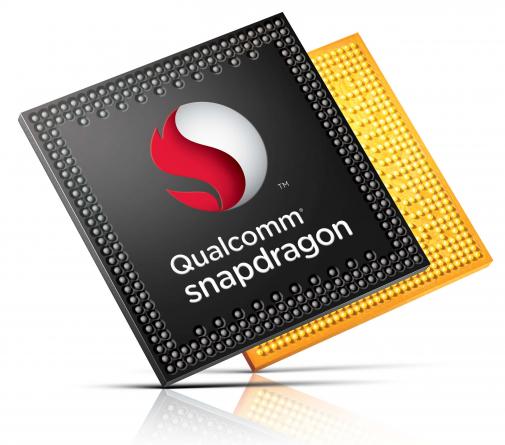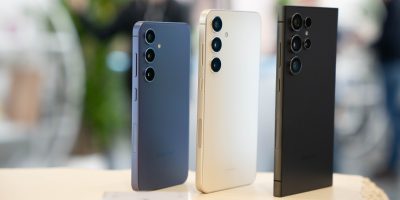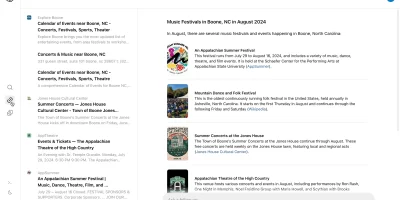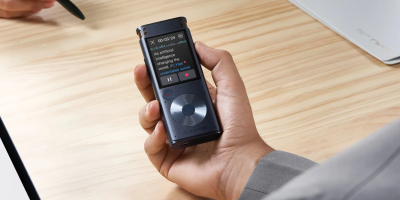While some of you no doubt already setting some money aside for new devices to arrive later this year with Qualcomm’s more powerful Snapdragon 805 processor (current rumors point to the Nexus 6, aka “Shamu” as one of the first), Qualcomm has apparently already begun testing their next model: the Snapdragon 810.
Announced earlier this year, we’re not expecting to get our hands on any devices running Qualcomm’s advanced Snapdragon 810 processors (MSM8994) until at least 2015, but the folks at GforGames spotted an AnTuTu benchmark running on a prototype device packing a 6.2-inch 1600×2560 resolution display, 4GB of RAM and is running on Android 4.4.2.

The benchmark doesn’t reveal much about the 810 other than some basic information like an Adreno 430 GPU and a 64-bit octa-core CPU (4 Cortex-A57 cores and 4 Cortex-A53 cores). Although not pictured, sources who spotted the results mention they were “impressive.” Keep in mind the CPU wasn’t even operating at full capacity when tested, showing a 200-940MHz clockspeed and not the usual 2GHz+.
While there’s no way we could guess which will be the first phone running the new processor, we can start placing bets (my money is on the LG G4).











“androids” really?
You telling me you don’t dream of Androidses?
Meesa thinks O’s Fan91 no likey strange plurals.
OK Jar- Jar….easy there killa
So should I just not even buy a phone until this comes out? Hmm…
No. Keep holding out until the Snapdragon 9,001.
Oh Em Gee….it’s really going to be over 9000?
Maybe it’ll have a 9K screen too
The way the numbers are advancing, I’m more than sure I could hold out until then. LoL!!
G4 will be a monster
Moar corez!
810 my ass…I’m waiting for 815.
Wuss. The 830 is where it’s at. :P
LOL
Going for 1000 myself
Why would Google sell the nexus 6 (with L) with a 32-bit processor instead of the 808 or this beauty?
Because the 808 and 810 won’t be available in production quantities until next year.
They’ll have the Nexus 8 with Nvidias 64 bit processor under the hood.
My nexus 7 with disagree with you on that. After Nvidia’s performance on the nexus 7 I don’t think I would want their processor on my next phone or tablet.
You obviously haven’t seen the leaks where the new 64 bit Nvidia processor decimates the snapdragon 805. If you want to make your buying decisions based on a chipset that’s over two years old have fun with that.
obviously the 805 is a 32-bit processor. I want the 810. Nvidia’s mobile processors just aren’t as good as qualcomm’s even google ended up choosing qualcomm over nvidia now that might change in the future but right now OEM’s are not going to put Nvidia’s K1 in a smartphone they are aimed for tablets.
Google is rumoured to be putting the tegra K1 in their next tablet and they have used tegra chips in the past too. Leaks indicate the K1 is substantially faster than anything on the market or likely to bw released soon including the 810. No point continuing a conversation with someone who’s unaware of the facts or chooses to ignore them when they are pointed out. As I said have fun making your tech decisions based on historical data that is over 2 years old.
I will make my decisions based on historical data including the nexus 7 that came out with qualcomm in 2013 and the various smartphones from various OEMs that have qualcomm instead of nvidia and you can make yours based on RUMORS.
– Also I just said that the K1 is targeted for tablets not smartphones.
– And Google used Nvidia in only one nexus device which was the 2012 Nexus 7
Now if you want facts, then here you go:
K1
– display max is 3840×2160
– ARM cortex -A15 (4+1 config)
– 28nm (uses more power+slower)
– memory LPDDR3
– modem = none
810
– 4K (4096×2160)
– quadcore A57+ quadcore A53 in big.LITTLE config (4+4)
– 20nm (uses less power+faster)
– memory LPDDR4
– modem LTE (a lot of bands) Advanced LTE + HD VoLTE
http://www.nvidia.com/object/tegra-k1-processor.html
https://www.qualcomm.com/products/snapdragon/processors/810
simply because 810/808 won’t be ready until next year.
With the less that impressive Note 4 so far, waiting for a device like this one is worth it.
If they were impressive at those clock speeds then I’d rather keep them at that speed and get better battery life.
Thats okay…. But… but. but…. enough with performance boasting. .. I need battery juice to last for at least a couple days and like this for at least an year… What gives?
Last for a couple of days? Do you live in the woods, and not have access to power outlets? Hmm…….
Device is running Android 4.4.2 instead of 4.4.4? It’s got to be a LG. They are always behind when it comes to software.
Or it could be any other OEM running on Verizon
Lol I get the joke, but it’s actually a Qualcomm reference device with prototype silicon.
810+Note Edge PLZ
What improvements does a 64-bit chip bring to performance?
Well it can do multi-tasking better in theory but only if the device also has 4Gb of ram to go with it. Sadly 64bit also means larger apps and since base storage still hasnt gone past 16Gb Im worried.
Well it has nothing to do with 4GB of RAM right now. Just look at Apple’s A7, it’s one of the fastest and most advanced SoCs and it’s only dual core 1.3GHz. It’s all about the ARMv8 architecture (Cortex-A53 and A57) that brings a lot of register, memory, and instruction set improvements to the design. Also I think the 20nm process is planned for next year that will lead to a big jump too.
The fact it handles 64-bit instruction set actually causes in increase in memory requirements in most apps. Down the road when 4GB is viable it’ll matter, but right now it’s those other improvements that brings a benefit.
Being 64 bit isn’t what makes the A7 such a beast it has far superior architecture to krait more in line with haswell, the powervr gpu is also class leading not to mention ios’s optimization, the 800/801 maybe marginally more powerful but the A7 is an impressive piece of kit but not because of its 64 bit capability Apple is just laying the groundwork for future developers.
but what does it matter if the phone is bigger than 4.7 inches?
Not much. It’s 32-bit/64-bit, so while the OS needs to be 64-bit, it can run 32-bit apps. That means 99% will remain 32-bit unless a significant advantage is found.
The S810 ditches the Krait architecture, so any performance improvements will come from that and the big.LITTLE architecture.
Anyway increasing IPC (instructions per clock) ALWAYS leads to better performing parts per MHz. Intel focused on this a while ago over pure clock speed. Apple also follows this trend.
Widening pipelines and improving efficiency also has advantages. For example, a 128-bit wide memory bus has great advantages for the GPU, but you’ll be hard pressed to see a huge improvement elsewhere (except benchmarks that purposely saturate the bus).
Floating point performance and overall I/O performance should be focuses in future architectures, IMO.
One of the advantages of the use of a virtual machine in Android, be it dalvik or art, is that this virtual machine can take advantage of the 64 bit pathways. Applications will benefit from this.
Meh. Heard that hype before with 64-bit Windows and desktop processors, and the performance was nearly identical – sometimes slower on the 64-bit OS using a 64-bit native application. Granted, Linux/Android is a lot better, but I’m a lot more cynical these days.
It all depends on how well it’s implemented. If it’s rushed, it’s going to be a slow, buggy mess. So, they all (software and hardware companies) need to focus on getting it right the first time.
I do play 64-bit Rage on my PC because it actually has improved performance over the 32-bit version, so there are positive instances. Unfortunately, it’s unsupported for technical issues (haven’t had any). I’m just glad the next-gen consoles finally have an x86/x64 processor, so maybe we’ll see a rise in 64-bit console and PC gaming.
Well, not really, because Windows doesn’t run applications in a virtual machine. One of the points of a virtual machine is that it can use whatever advantages the hardware provides without programs having to be recompiled.
If you read Anandtech you would find A64 code path reduces instruction set by 30% over A32. This is a large reason a 1.3Ghz A7 core runs circles around a Krait 400 clocked twice as high.
Intel has 64-bit x86 for windows and Linux/android for a long time. The Qualcom as a company and their smart but moron development vice president made statement when Apple came out with the 64-bit A7 for iphone 5s that there is no real benefit to 64-bit processor for the mobile devices. Now, they eat their own S* and following Apple’s lead. Anyway, I am glad they doing it after Navidia announced their 64-bit ARM android processor.
The VP that said that is answering phones until his contract runs out.
I’m still waiting on an Android that gets a faster core score than my 2013 iPhone.
Still waiting on an Apple device that has better battery life and screen than my 2010 Android phone. Keep your core score.
Better battery than your Nexus 5, not to mention a display that isn’t washed out.
Sorry that Androids w/ AMOLED haven’t had a washed out screen since 09.
Nexus 5 uses IPS… duh
I said ANDROIDS w/ AMOLED not NEXUS w/ IPS LCD.
I know the difference.
Thanks
And I said Nexus… read before commenting.
so what kind of score 810 get on antutu?